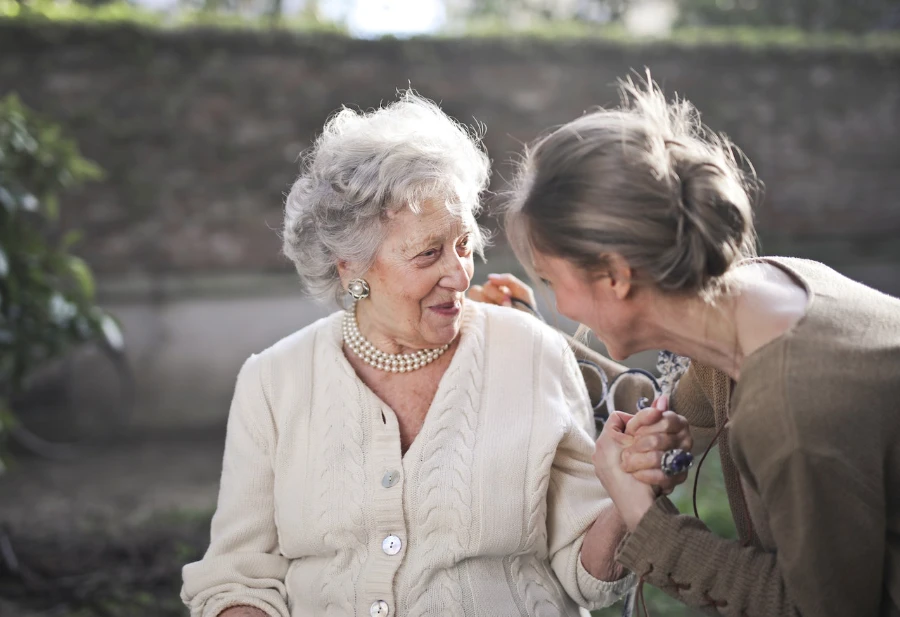Uncovering the hidden struggles of caregivers’ responsibilities, demands and burnout.
Caring for those we love is often seen as an integral part of our lives, but it can be hard to recognise when the responsibilities have gone beyond our means.
It’s easy to keep going and try to do too much, but understanding our limitations can save us a lot of time and effort. It’s important to remember that caring for ourselves is just as crucial as caring for others. We must set healthy boundaries and learn to say no when overwhelmed.
It may initially feel uncomfortable, but it’s necessary for our well-being. Seeking support from others can also be beneficial. Whether talking to a friend or seeking professional help, reaching out can make a significant difference.
Remember, asking for help and stepping back when needed is okay.

What does having caring responsibilities mean?
Caring for a loved one can be a rewarding experience, but it can also be challenging and demanding. In this section, we will explore what it means to have caring responsibilities and provide some insights on handling them effectively. Understanding your role and its implications is essential for you and the person you care for.
Identifying the Types of Caregiving Responsibilities
The first step in understanding caregiving responsibilities recognises the different types of care that may be required. These can include:
- Personal care: Assisting with daily activities such as bathing, dressing, and grooming.
- Medical care: Administering medications, monitoring vital signs, and providing wound care.
- Emotional support: Offering companionship and a listening ear and helping people cope with their feelings.
- Household tasks: Cleaning, cooking, shopping, and managing finances.
- Transportation: Driving or arranging transportation to appointments, social events, or running errands.

What are the emotional effects of caring for an elderly parent?
Caring for an elderly parent can be a physically and emotionally demanding task. As a caregiver, you may feel overwhelmed by the responsibilities and their impact on your life. In this section, we’ll explore the emotional effects of caregiving and discuss ways to cope with these challenges.
Here are some steps to acknowledging the emotional effects
Step 1: Acknowledge your feelings
The first step in dealing with the emotional effects of caregiving is to acknowledge your feelings. It’s normal to experience a range of emotions, including frustration, anger, guilt, sadness, and even resentment. Please recognise these feelings as natural and valid and permit yourself to feel them without judgment.
Step 2: Identify sources of stress
Take time to reflect on the aspects of caregiving that cause you the most stress. This could be the physical demands of assisting with daily activities, managing medical appointments and medications, or dealing with the emotional toll of watching a loved one decline. Identifying these stressors can help you find ways to address them and ease the emotional burden.
Step 3: Seek support
Don’t hesitate to contact friends, family members, or professional support groups to share your feelings and experiences with caregiving. Talking about your struggles can provide relief and allow others to offer advice and encouragement. Remember, you don’t have to go through this journey alone.
Step 4: Set boundaries
It’s important to set boundaries to protect your emotional well-being. Communicate with your loved one and other family members about your limits and ask for help when needed. Establishing realistic expectations about your role as a caregiver can prevent burnout and reduce feelings of resentment.
Step 5: Prioritise self-care
Taking care of yourself is crucial for managing the emotional effects of caregiving. Find time each day for activities that bring you joy and relaxation, such as exercise, reading, or spending time with friends. Remember that prioritising self-care doesn’t mean neglecting your loved one; it’s essential for maintaining your emotional well-being, ultimately benefiting you and the person you care for.
Step 6: Consider professional help
If your caregiving responsibilities significantly impact your emotional well-being, consider seeking professional help from a therapist or counsellor. They can guide you on coping strategies and help you navigate the complex emotions associated with caregiving.
In conclusion, the emotional effects of caring for an elderly parent can be challenging. Still, it’s essential to recognise and address these feelings to maintain your well-being.

Giving Up Your Life to Care for Elderly Parent
In today’s fast-paced world, caring for an elderly parent can be challenging. When their needs go beyond your capabilities, it may require making significant sacrifices in your own life, such as quitting your job and putting personal relationships on hold.
It’s a difficult decision, but placing your parent in assisted living or hiring an in-home care provider may be the best option. It’s important to remember that this decision is not a sign of defeat or failure but rather an act of love and responsibility towards your parent’s well-being.
Many seniors thrive in assisted living communities, where they can socialise with other residents and receive the necessary care and attention from trained professionals. Whatever your decision, know that you are not alone, and resources are available to help you navigate this challenging time.

When Being a Carer Becomes Too Much
Caring for a loved one can be a fulfilling and gratifying experience, providing essential support and care to those in need. However, the weight of caregiving responsibilities can sometimes become overwhelming and may go beyond your means.
Recognising these moments is crucial to ensure you and the care recipient receive the support necessary to maintain a healthy and balanced life. In this section, we will discuss the signs that indicate being a carer has become too much and explore practical steps to take when this happens.
How to recognise Caregiver burnout and what you can do
When caring for a loved one as a caregiver, knowing what burnout is and how to recognise the symptoms is essential. Burnout is a state of emotional, physical, and mental exhaustion often caused by prolonged and intense stress.
As a caregiver, it’s easy to become overwhelmed and neglect your own needs while focusing on the needs of your loved one. However, if you don’t care for yourself, you may experience burnout, leading to frustration, hopelessness, and depression.
Here are some simple steps to take in recognising burnout and what you can do:
Step 1: Recognise the Signs of Caregiver Burnout
The first step in addressing the issue of caregiving becoming too much is to recognise the signs of caregiver burnout. These can include:
- Feeling constantly exhausted
- Experiencing difficulty sleeping or insomnia
- Changes in appetite or weight
- Increased irritability and frustration
- Withdrawing from social activities or relationships
- Declining mental health, such as increased anxiety or depression
If you notice these symptoms within yourself, it’s essential to acknowledge them and seek support.
Step 2: Communicate Your Struggles
Once you have recognised the signs of caregiver burnout, the next step is communicating your struggles with those around you. Talk to family members or friends about your feelings and concerns.
Sharing your experiences and difficulties can provide emotional relief and help you gain perspective. Additionally, discussing your challenges may lead to potential solutions and assistance from others.
Step 3: Seek Professional Help
If your caregiving responsibilities continue to be overwhelming despite sharing your struggles with others, it may be time to seek professional help.
A therapist or counsellor specialising in caregiving issues can provide valuable guidance and coping strategies tailored to your needs.
They can also help you develop a self-care routine to maintain physical and emotional well-being.
Step 4: Explore Respite Care Options
Respite care is a short-term or temporary caregiving service that allows caregivers to take a break from their responsibilities while ensuring their loved one continues receiving the necessary care.
Exploring respite care options can provide a much-needed pause and help prevent caregiver burnout.
Various respite care options are available, such as in-home care providers, adult daycare centres, or even residential care facilities.
Step 5: Consider Long-Term Solutions
If your caregiving responsibilities continue to be too much despite taking the above steps, consider long-term solutions for your loved one.

Help For Carers Looking After A Loved One
Help for carers looking after a loved one can be physically and emotionally demanding when their needs exceed your capacity to manage. In these instances, you must seek professional assistance from experienced carers who can support you.
At Hygea Homecare, we offer a range of services tailored to ease the pressures of caregiving and ensure that your loved ones receive the best possible care.
In this section, we’ll guide you through the steps to access help from our team of friendly and experienced carers.
Step 1. Assess your needs and requirements
Before seeking external help, take some time to evaluate your loved one’s specific needs and the areas where you require assistance. This may include personal care duties, medication administration, or companionship. A clear understanding of your requirements will enable you to communicate effectively with potential carers and ensure the most appropriate support can be provided.
Step 2. Research available services
Hygea Homecare offers various services to cater to the diverse needs of our clients. These include short-term respite care, which allows carers to take a break while we look after your loved one, and more long-term care assistance at home. Please familiarise yourself with our services and identify the best option for your situation.
Step 3. Contact Hygea Homecare
Once you understand your needs and the services available, contact us to discuss your requirements further. You can do this by visiting our contact page, emailing or calling us at 0115 648 6630. Our friendly staff will happily answer any questions and guide the next steps.
Step 4. Schedule an initial consultation
During the initial consultation, a team member will visit your home to assess your loved one’s needs and develop a personalised care plan. This is an excellent opportunity for you to ask any questions, express concerns or discuss specific requirements you may have. The consultation will also allow our professionals to determine the level of care appropriate for your loved one and identify any potential challenges that may arise during care.
Step 5. Select the most suitable carers
Based on the information gathered during the initial consultation, we will carefully select carers who best fit your loved one’s needs and preferences. At Hygea Homecare, we pride ourselves on our team of experienced, compassionate, and highly skilled carers, ensuring that the person looking after your loved one is well-equipped to provide the highest quality care.
Step 6. Begin receiving care and support
With a personalised care plan and suitable carers selected, you can now begin to receive the help and support you need.


